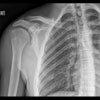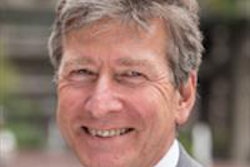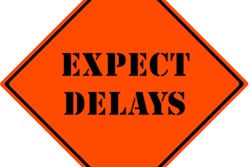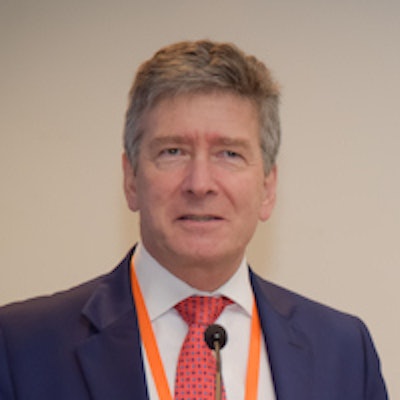
The U.K. Royal College of Radiologists (RCR) leads, educates, and supports doctors who are training and working in the specialties of clinical radiology and clinical oncology. At the helm is Dr. Giles Maskell, a consultant radiologist at Royal Cornwall Hospitals National Health Service (NHS) Trust. In this interview, he shares his views on topical issues in medical imaging and sheds some light on his work as president of the RCR.
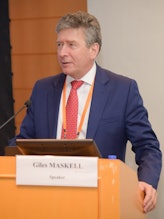 Maskell was a guest speaker at a recent scientific meeting in Hong Kong.
Maskell was a guest speaker at a recent scientific meeting in Hong Kong.What is your main concern at present?
Maskell: The biggest problem for us at the moment in radiology is the mismatch between the number of people we have and the amount of work we are trying to do. Our workload in the complex modalities such as CT and MRI is going up 10% to 12% per year every year and our workforce has not kept pace. We have half as many radiologists as most other Western nations per head of population.
It's got like this because radiology doesn't have the profile it needs and deserves. People don't even know who we are and what we do; the public and even some doctors may not know the difference between a radiologist and a radiographer. That's another challenge for us. We must have a higher profile and ultimately we have to be more visible to patients. Until we get more of a profile with patients and they know we are the experts who look at their scans, then we aren't going to make a lot of progress because the public mood is reflected in the press and by the politicians. That's my other main job: to raise our profile.
How will the U.K. National Health Service cope with increasing demand for imaging services?
With great difficulty. We don't have enough people, we have too much work, and we have huge numbers of patients waiting a long time for the results of their tests. We need to train more people and also improve the working environment -- make work more rewarding, more flexible, and enjoyable. For some people, reporting at home for two hours will let them get more done. We should also consider what we can do to prevent older radiologists from retiring early.
Where will radiology be in 10 years time?
Medicine will become more dependent on imaging. We have to become more aware as radiologists. If we do not stay on top of this, other people will.
There will be new modalities, expansion of existing modalities, growth in molecular and functional imaging, and increase in treatments available.
Another issue will be our relationship with patients. There will be increasing pressure to send reports directly to patients. That fits with the current philosophy in healthcare, putting the patient at the center and giving them more control, but it will create a lot of difficulties. That's why we want people in radiology who are ready to talk to patients. Radiology reporting is a process of interpretation that has to be done in the context of the individual patient.
One of the biggest handicaps for radiology is that everyone thinks what we do must be easy. In contrast to this is histopathology, where no one thinks they can interpret the histology slides whereas everyone thinks they can interpret the x-rays.
Can you tell us about your average week and your personal role?
In a normal week I do 2.5 days of clinical work at my base in Cornwall and then head to London. There are lots of meetings and I talk at various events representing the college in discussions with the General Medical Council, Care Quality Commission, Health Education England, and other bodies to put our opinion on various issues. It's about being the voice of radiology and clinical oncology.
The whole point of the college is the collective effort. My mission is to get as many great people as we have pulling in the same direction and trying to do the same kind of things for the benefit of patients. A personal highlight is always the new fellows meeting, for the doctors who have passed their exam and are new fellows of the college. It's an inspiring occasion because everyone is feeling good about themselves.
Looking at your career in radiology, what have been the main highlights?
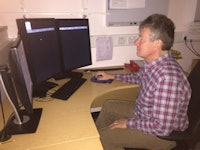 When he is not engaged in RCR activities, Maskell still makes sure he does reporting sessions.
When he is not engaged in RCR activities, Maskell still makes sure he does reporting sessions.There have been too many to list, but I do particularly recall accidentally reducing a patient's cervical spine dislocation in the process of moving him onto the CT scanner. That was exciting! I had an interesting conversation with the neurosurgeon afterwards. Everyone was happy.
I had done some gastroenterology first, and having that basic knowledge helps a lot, especially in discussions with clinicians. You have a better understanding of what they are asking after. Radiology reporting is not just about describing everything, it's about putting it in the context of the patient and knowing if the patient has this and that condition, or is worried about anything in particular.
Interpreting radiological images is very difficult. The more you get into it, the more difficult it is, with all the subtleties, all the data. The biggest skill is teasing out the important findings. Surgeons are almost surprised at times when they operate after our CT diagnosis and they come and tell me "you were right" in an almost surprised way.
What's changed during your career within radiology?
New technology. CT was a rarity and now we do hundreds every day. It seems now that most patients in hospital can't be managed without a CT scan. That's been an incredible change. Another big change is digital imaging.
The advent of CT and MRI has taught us that clinical examination and even plain x-rays are not as good as people used to think. But even now, the diagnostic process starts with a history and examination. Over-reliance on the imaging without considering the context of the individual patient can get us -- and the patient -- into trouble.
What single piece of advice would you give to a budding radiologist?
Think about the patient; it's all about the patient. It's not about the pictures or the radiologist. Everything we do as radiologists should be to improve the health of the patient. Keep the patient at the center, and remember we can get it wrong.
Dr. Jim Zhong and Dr. Andrew Koo are radiology registrars at Leeds General Infirmary in the U.K.
